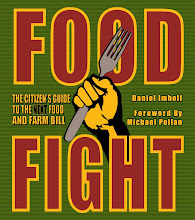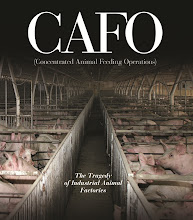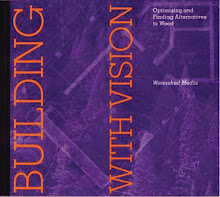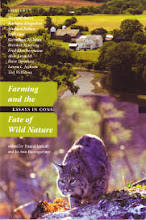First, a confession. I am a reluctant wonk. Despite writing rather extensively about food and agriculture policy, acronyms are not what motivate me in the morning. After about a half an hour of studying something as dense as the Farm Bill, I need a diversion, a few minutes of deep breathing outside with my feet on the ground, or some quality time with Fanny, my Australian shepherd.
I do believe that agriculture is indeed a public good. Food and farm policy are not a necessary evil but a real privilege and opportunity for a country and its people. It is wise to invest in conservation, clean water, soil protection, and habitat enhancement for our collective good. The natural world, well attended, cannot keep pace with the growth demands of the industrial economy and Wall Street. Unfortunately, our rural lands, farm animals, and agriculture workers are being driven by efficiency, industrial concentration, and profit taking. Rather than investing in tangible returns and long-term security, agriculture policy is pushing us toward the brink of collapse on many fronts.
For those who care about healthy food, the Farm Bill is something we all need to digest—even in small helpings. The information is out there, accessible and more organized than ever before, even if the situation is not so rosy. (Check out www.farmpolicy.com everyday for a week to get started.)
The Farm Bill is a massive legislation that is revisited every five to seven years. The next renewal is scheduled for 2012 but it could likely drag on into 2013 or beyond. For the last few decades the Farm Bill has been dominated by two primary political forces: a nutrition and hunger bloc that fights for food stamps (now known as SNAP) and other assistance; and the commodity agriculture lobby (corn, cotton, wheat, rice, soybeans, dairy, sugar producers, and concentrated animal feeding operations or CAFOs). This is your basic quid pro quo. Urban legislators get food assistance for the 40 million Americans facing hunger on a regular basis. Farm country legislators bring home the bacon to huge agribusinesses that are now raking in record profits.
My least favorite of these commodity players hijacking taxpayer dollars are the CAFOs. Not only are their factory animal farms morally reprehensible, they are fouling the air, water and land in the communities where they have taken over and are feasting at the public trough in the process. Their economic model is based upon a steady supply of Farm Bill subsidized feeds—corn and soybeans—that has saved them billions of dollars over the last decade. (This is well documented in a report by Timothy Wise and Elanor Starmer from Tufts University). In 2002, the CAFO industry began raiding precious Farm Bill conservation dollars to pay for nasty manure lagoons and waste management infrastructure. A single CAFO investor can qualify for $450,000 in Environmental Quality Incentive Program dollars to pay for his or her own pollution compliance. (Read Martha Noble’s essay in The CAFO Reader for a more detailed summary.)
One would think that once the CAFOs and other commodity producers get their 10 billion to 20 billion dollars each year from the taxpayers, their lobbyists would be content to let the rest of the players fight over the scraps: a few billion here for conservation, a few million here for rebuilding local food capacity, a few million for those organic farmers who pay high certification costs just to prove they are doing the right thing. But agribusiness is not content. They are fighting for every last cent of Farm Bill dollars and doing all they can to paint the burgeoning good food movement as fringe and meaningless.
Last year, Senators Mc Cain (R-AZ), Chambliss (R-GA) and Roberts (R-KS) publicly attacked Secretary of Agriculture Tom Vilsack and a small program named Know Your Farmer, Know Your Food. KYF 2 (in Wonk speak) was spending approximately $65 million to rebuild local food systems around the country, including developing new markets in urban areas for rural farmers hoping to expand their businesses. In highly divisive language, the Senators claimed that this money was benefitting organic hobby farmers supplying urban elites at farmers markets, rather than “Production Agriculture.” This is the term for heavily subsidized monoculture commodity farmers that largely grow crops we don’t directly eat. Just to give some perspective on that $65 million Know Your Farmer program budget, Brazilian cotton farmers received $165 million last year from our government in retaliation for past U.S. cotton subsidies deemed illegal by the World Trade Organization. The Senators wrote no nasty letters to the Secretary about those payouts to farmers in another country as far as I know. Then again, there are a lot of cotton farmers in Arizona and Georgia.
Last week the rules were finalized on another 2008 Farm Bill program called the Farm and Ranchland Protection Program (FRPP). One would hope this money would go to protect beautiful farmlands in areas threatened by sprawl and development. But in keeping with their strategy of fighting for every last cent of the Farm Bill pie, agribusiness lobbyists were able to make a CAFO manure lagoon (a cesspool of waste) eligible for protection under Farm and Ranchland Protection Program easements. Maybe there is something I don’t quite understand — such as even small operations have such holding facilities — but somehow this doesn’t seem what the program was intended to preserve. (Read the National Sustainable Agriculture Coalition’s report here.)
As you can see, foodies, foodists, healthy food activists, and concerned citizens have no choice but to begin to understand the detailed maze of farm policy. Our challenge is to move from acting individually to developing collective clout. It’s the only way voting with our forks might begin to change the enormous power corporate agribusiness wields over our food system.









